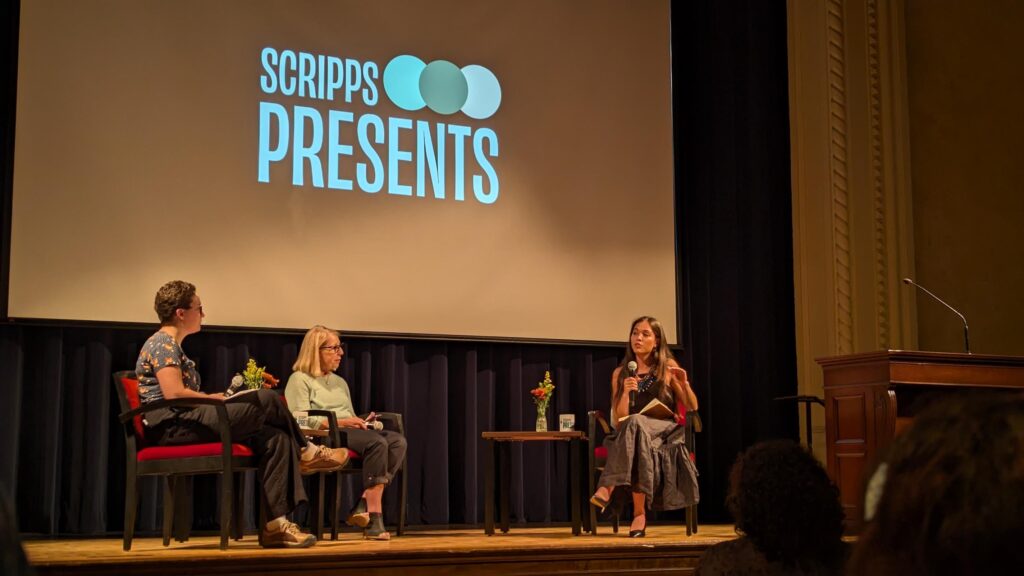Zoe Tomlin ‘27
Staff Writer
On Sep. 19, Scripps Presents hosted Xiye Bastida, a 22-year-old Mexican climate activist, in Balch Auditorium. In conversation with the Scripps Sustainability Coordinator, Naomi Friedman, and Scripps Art Professor, Nancy Macko, Bastida discussed her emergence into the world of climate activism and her accomplishments, which include Initiative in 2020 and speaking at President Biden’s Climate Summit in 2021. Bastida is currently studying Environmental Studies and Policy at the University of Pennsylvania.
When asked about the roots of her climate activism, Bastida told the story of her parents. Bastida was born in 2002 to a family of environmentalists in Toluca, Mexico, who raised Bastida to respect the Earth and embrace the Indigenous concept of reciprocity. Bastida admitted that, in her early years, she found their ideas odd, but when her hometown flooded at 13, she realized the urgency and importance of their belief system.
Bastida moved to New York City in 2015 when her parents accepted jobs at the Center for Earth Ethics. She learned English and joined an environmental club at school. There, she pushed for her classmates to engage with the political side of climate activism. She participated in School Strike for Climate, where she stood outside of the UN building every Friday for over a year, and co-organized the Sept. 2019 climate strikes in New York City, which saw 300,000 people take to the streets.
Bastida stressed that climate strikes often serve as a way to get the attention of elected officials, something Bastida consistently emphasizes in her work. “If we don’t make intergenerational leadership a must,” she explained, “[the leaders] will keep avoiding it because it is uncomfortable to listen to people who think differently.”
As an example, she recounted a sobering moment when, after being invited to give the closing speech at the UN World Leaders Summit, she arrived to find the audience empty. The global leaders that she planned to address had left.
The lack of connection contrasts significantly with the intergenerational engagement and respect she experienced in her hometown. Growing up, circles of both youth and elders were common in her community, and she noted that “elders are so wise because they listen to the youth.”
In spite of the disappointing turnout at the UN, Bastida delivered her speech at the Summit; “They call us naive… naiveté is thinking that we can keep living in this world and that it will be okay. It is not naive to think that we deserve a better world.” As easy as it would have been to leave, Bastida recognized the power of her voice.
Bastida then spoke on the concepts of peace and violence, reframing them for the audience, saying, “Peace is not just the nonproliferation of war… peace is that we don’t have to be scared of climate instability… it is the nonproliferation of things that are dangerous to us.” The impacts of the climate crisis – food scarcity, massive floods, and displacement – are inherently violent and antithetical to peace. Bastida noted that, by 2050, it is anticipated that the climate crisis will force 1.5 billion people to migrate, many of whom are already vulnerable.
While 2050 may seem far off, Bastida reframed one common perception of the climate crisis: that it is “the apocalypse coming.”
“There are so many communities whose worlds have already ended,” she said “So many communities that, when the flood happened, their worlds ended. When colonization happened, their worlds ended.”
Those endings, however, are not reasons to be hopeless, just as fear is not a reason to be hopeless. Bastida continued, “So many communities have actually lived through periods of rebuilding and resistance and resilience.”
The fight for peace, climate or otherwise, is not new. Furthermore, it must continue, and it must do so with hope. To Bastida, hope is “something that you owe to the person next to you… Hope is a responsibility.”
The conversation came to a close with a few more tidbits of Bastida’s wisdom. She encouraged the audience to stop focusing solely on traditional measures of tracking climate change, like carbon emissions, and instead place attention on Planetary Boundaries. The Planetary Boundaries are a set of nine processes that regulate the Earth as an entire system; of those nine, six have already been crossed. She spoke of the importance of investing money in climate solutions and adaptations that protect and prioritize vulnerable communities.
Finally, she expressed the importance of acting locally and engaging with nature. Bastida explained how Western forms of thought separate humans from the natural world in ways that permit the exploitation of the Earth. Western thinking, she explained, has falsely separated humans from the natural world, enabling the exploitation of the Earth. “Nature and water are not resources…” she said. “They are sacred elements. Mindset shifts [like these] are the only ways that [we] can realize ourselves [as] stewards and protectors [of the land].”
Photo Courtesy: Juliette Des Rosiers ’26



